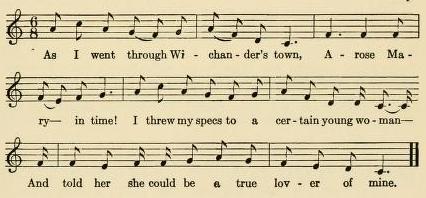Elfin Knight: Versions from Brown Collection of NC Folklore
The Elfin Knight (Child 2)
This set of courting riddles, commonly known in this country as 'The Cambric Shirt,' though not very old (the earliest text known to Child was a seventeenth-century broadside), has persisted rather well both in the old country and in America. It has been reported from tradition in Ireland, Aberdeenshire, Yorkshire, Northumberland, Sussex, Wiltshire, and Somerset, and in Maine, Vermont, Massachusetts, Rhode Island, Pennsylvania, Virginia, Kentucky, North Carolina (apart from the present collection), Georgia, Florida, Texas, Arkansas, Missouri, Ohio, Indiana, Illinois, Michigan, Nebraska, and California.
It has two chief types of refrain, one of which, "rosemary and thyme," undergoes strange transformations on the tongues of singers — none stranger, perhaps, than the "arose Mary in time" and "Rose de Marian time" of texts A and B below. The other type, represented in text C below, seems to be only American. It is recognizable in Child's version J, which came from Massachusetts, and in texts from Maine, Vermont, Indiana, Missouri, and Texas, but I have not found it in British texts.
A. 'The Cambric Shirt.' Sent in by Professor W. Amos Abrams, formerly of the Appalachian State Teachers College, Boone, Watauga county, as secured from Mary Bost, of Statesville, Iredell county.
1 As I went through Wichander's town,
Arose Mary in time!
I threw my specs to a certain young woman
And told her she could be a true lover of mine.
2 Tell her to make me a cambric shirt,
Arose Mary in time!
Without seam or needle's work
Before she can be a true lover of mine.
3 Tell her to wash it in a well
Arose Mary in time!
Where water never ran nor rain never fell
Before she can be a true lover of mine.
4 Tell her to hang it on a thorn,
Arose Mary in time!
Where leaves never grew since Adam was born
Before she can be a true lover of mine.
5. As I went through Wichander's town,
Arose Mary in time!
I threw my specs to a certain young man
And told him he could be a true lover of mine.
6. Tell him to clean up one acre of ground,
Arose Mary in time!
Between salt sea and Dace town
Before he can be a true lover of mine.
7. Tell him to plow it with a thorn,
Arose Mary in time!
Plant it all over with one grain of corn
Before he can be a true lover of mine.
8 Tell him to reap it with a pea-fowl's feather,
Arose Mary in time!
Wrap it all up with one stirrup of leather
Before he can be a true lover of mine.
9 Tell him to thrash it against the wall,
Arose Mary in time!
For his life, never let a grain fall,
Before he can be a true lover of mine.
10. Tell him to take it to the mill.
Arose Mary in time!
Every grain a barrel shall fill
Before he can be a true lover of mine.
B. 'Rose de Marian Time.' Recorded by Professor Richard Chase of the Institute of Folk Music at Chapel Hill in 1936 from the singing of Mrs. Fannie Norton of Norton, N. C. Similar to A, but the refrain is "Rose de Marian Time," the first stanza has "yonder town" and "young lady" instead of "Wichander's town" and "young woman," and it lacks the odd expression "I threw my specs." Instead of "Between salt sea and Dace town" it has "Between salt water and sea shore."
There is in the collection another text sent in by Professor Chase in the same year, a version "edited for teaching." It is not clear from the manuscript just what the editing consists of, nor whence this version was procured. The last six of its ten stanzas (without the second and fourth lines, i.e., the refrain) run as follows:
5 I came back from yonder town —
She sent word to that young man.
6 Tell him to clear me an acre of land —
Between the sea and the salt sea strand.
7 Tell him to plow it with a muley cow's horn —
And sow it all over with one grain of corn.
8 Tell him to reap it with a stirrup leather —
And bind it all up in a chee-chicken feather.
9 Tell him to thresh it in a shoe sole —
And crib it all in a little mouse hole.
10 Tell him when he's done this work —
Come to town and get his shirt.
C. 'The Cambric Shirt.' Two stanzas only, contributed in 1923, by Mildred Peterson of Bladen county.
1. Can you make me a cambric shirt —
Flunia luna lokey slomy —
Without seam or fine needle work?
From a tastum tasalum tenipluni
Flunia luna a lokey slomy.
2 Can you wash it in a well —
Where water never run nor well's never full?
-----------------------
D. Mrs. James York of Olin, Iredell county. Recorded at Boone, September 14, 1941, by Dr. W. A. Abrams. For additional titles to those given in BTBNA 30, of. BB 2-3: 'Whittingham Fair'; also AFM No. 9: 'Parsley and Sage.' The latter is also the refrain of the former.

Scale: Hexatonic (4), plagal. Tonal Center: f. Structure: aa1 (4,4). Circular Tune (V).
B. 'Rose de Marian Time.' Sung by Mrs. Fannie Norton of Norton, Jackson county. Recorded at Chapel Hill, 1936, by Professor Richard Chase.


1. As you go through yonder town
Rose de Marian Time!
Take this dress to that young la dy
And tell her she is a true lover of mine.
Variant text of stanza 2:
Tell her to make me a cambric shirt,
Rose de Marian time!
Without any seam or seamster's work,
Then she'll be a true lover of mine.
For melodic relationship, of. OSSG 18, No. 8. Scale: Mode III. Tonal Center: d. Structure: ab (4,4).